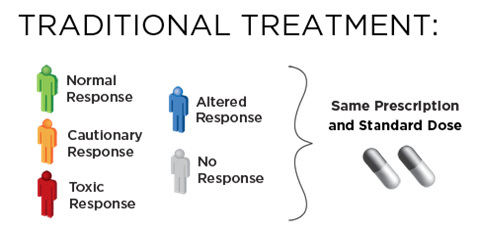Authors: Shubhanka A C
Pharmacogenomics is the study of how genes affect a person’s response to drugs. This relatively new field combines pharmacology (the science of drugs) and genomics (the study of genes and their functions) to develop effective, safe medications and doses that will be tailored to a person’s genetic makeup.
Normal variations in your genes (scientists call them polymorphisms) can produce proteins that work differently from those of your friends or relatives. This can tell us that if the drug is responding to the disease or not. It also tells us how the proteins responsible for the breakdown of the drugs are doing their job and how it varies from each person to person. Studies show that genetic variations in the body proteins that metabolize the drug can have severe effects. If the drug is metabolized too fast, it will be eliminated from the body before it has time to work. If the drug is metabolized too slowly it might accumulate to harmful levels.
The purpose of pharmacogenomic testing is to find out if a medication is right for you. Here are some of the benefits of pharmacogenomics:
- Whether a medication may be an effective treatment for you
- What the best dose of a medication is for you
- Whether you could have serious side effects from a medication.
- More accurate and better drugs at the first time.
- Also, the success rate of the medication working on the patient will be high.
- Clinical trials will become cost effective.
As mentioned before, we know that doctors prescribe medicine commonly to everyone with the same dosage to the same disease, but this resulted in different responses to different people. Sometimes doctors even tried trial-and-error method to find out the root cause of the problem. Here below is one of the example:

(Picture: google images)
Pharmacogenomics may also help to save you time and money. By using information about your genetic variations and differences, doctors soon may be able to avoid the trial-and-error approach of giving you various drugs that are not likely to work for you until they find the right medicine. One current use of pharmacogenomics involves people infected with the human immunodeficiency virus (HIV). Before prescribing the antiviral drug abacavir (Ziagen), doctors now routinely test HIV-infected patients for a genetic variant that makes them more likely to have a bad reaction to the drug.
Another example is the breast cancer drug trastuzumab (Herceptin). This therapy works only for women whose tumours have a genetic profile that leads to overproduction of a protein called HER2. New researches are going on to understand how genomic information can be used to develop more personalized and cost-effective strategies for using drugs to improve human health.
Hence, pharmacogenetic research is mainly used for diagnostics, not preventive. When a patient has an unexpected reaction to a drug, pharmacogenetic tests can reveal why and is it related to the genes. Even though it’s a new concept one of the main reasons for it to be important is how we can get the right medicine at the right dose at the right time. It is important to give the right medicine even in advance based on the genes and its variations.
References
https://www.futuremedicine.com/loi/pgs
https://www.genome.gov/27530645/FAQ-About-Pharmacogenomics
https://www.yourgenome.org/stories/how-is-pharmacogenomics-being-used
https://www.ncbi.nlm.nih.gov/pmc/articles/PMC3351041
About Author / Additional Info:
I'm studying B.tech in biotechnology in BIET,Davangere. I'm in my first year, I'm very curious about biotechnology, genetics and related topics.